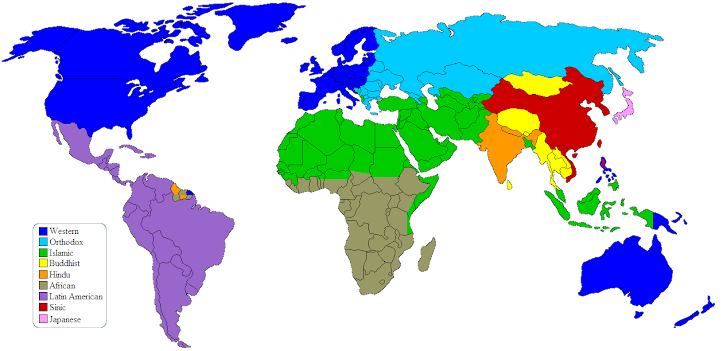How is it possible that a "Christian" church generates racism and xenophobia even in the 21th century?
Which are the social causes of that phenomenon?
Google book results from 21th century
(Books, UN reports , and writtings of western Sociologist scientists and Civil Rights movements)
There are more than 3 090 results for the relationship of racism xenophobia within the Orthodox Church. It often works like an engine of ethnic hatred and chauvinism until this day. It had much deeper medieval roots, it appeared even before the era of "National awakening" aka. the birth of the nationalism.
UN. Dag Hammarskjöld Library : United Nations Documents Index: No.4 January-march 2004 - Page 107
...by the Special Rapporteur on Contemporary Forms of Racism, Racial Discrimination, Xenophobia and Related Intolerance, focuses mainly on the status and importance of the Romanian Orthodox Church, the situation of non- Orthodox
Cristian Romocea : Church and State: Religious Nationalism and State Identification ... - Page 137
Attempts at inner spiritual resistance and formal denunciations of xenophobic and anti-Semitic political activities came only ... Conclusion The investigation of the history of Orthodox church–state relations has shown that Romanian Orthodox
John Anthony McGuckin - The Encyclopedia of Eastern Orthodox Christianity, 2 Volume Set - Page 504
.. (over Estonia and Ukraine) and the R.O.C. / Romanian Orthodox Church (over Moldavia); some of them are still unresolved. The ROC has also been deeply affected by the tides of widespread xenophobia, nationalism, fundamentalism,
Linda Woodhead, Christopher Partridge, Hiroko Kawanami: Religions in the Modern World: Traditions and Transformations
In many cases they have been active in supporting the resurgent forms of ( sometimes xenophobic) nationalism which have developed in the wake of communism. Themost notorious example has been in Serbia, where the Serbian Orthodox Church
Elizabeth Pond: Endgame in the Balkans: regime change, European style - Page 226
and thus maintain the unity of the Serbian Orthodox Church, as well as his rejection of Western liberal norms. ... figures" with the values of the Serbian Orthodox Church, "marked by archaism, collectivism, anti-Western stands and xenophobia.
Geraldine Fagan - Believing in Russia: Religious Policy After Communism - page: 205.
Alexander Verkhovsky, 'Role of the Russian Orthodox Church in Nationalist, Xenophobic and Anti-Western Tendencies in Contemporary Russia: Not Nationalism, but Fundamentalism', paper for 'Xenophobia and Postsocialism'
Raphael Walden :Racism and Human Rights - page 123.
Finally, given the prominence of the Russian Orthodox Church in the formation of post-Soviet national identity and its unhappy ... of the multi-ethnic Russian Federation, in the development of measures to combat xenophobia and intolerance.
Daphne Halikiopoulou - Patterns of Secularization: Church, State and Nation
Homogeneity as the ultimate national value may promote xenophobia and totalitarian attitudes (Fragoudaki and Dragona, 1997: ... identity, and increases the need to assert this identity and rally around its main defender: the Orthodox Church.
Stephen R. Goodwin : World Christianity in Local Context: Essays in Memory of David A.
These xenophobic features of Bulgarian nationalism have cloaked ethnic and religious discrimination in patriotic wrappings, placing membership in the Bulgarian Orthodox Church and devotion to the Fatherland above all. This nationalism
Daniel B. Clendenin: Eastern Orthodox Christianity: A Western Perspective
This xenophobia toward the West has ebbed and flowed over the past one thousand years in the life of Russia in general; in the last five years it has markedly increased within the Orthodox church. The Russian Orthodox Church, which with
Daniel Benjamin : Europe 2030 - Page 118
On the other hand, the growing influence of the Orthodox Church and widespread xenophobia and intolerance of minorities could generate social tensions and amplify Russia's demographic challenges. Russia should learn from Europe
Benjamin Forest, Juliet Ellen Johnson, M. T. (Marietta Tigranovna) Stepaniants: Religion And Identity In Modern Russia: The Revival Of Orthodoxy ... - Page 137
The Orthodox Church has also adopted a defensive position in regards to perceived religious competitors and free speech. Chistiakov laments the xenophobia and "opposition to Christians of other traditions" expressed by many in the Church
Allen D. Hertzke: The Future of Religious Freedom: Global Challenges - Page 193
In a July 2007 open letter, leading academics, journalists, and human rights activists accused the Orthodox Church of fostering a “new national and religious ideology” that risked negating democracy and “endorsing xenophobia and a cult of
Katja Richters : The Post-Soviet Russian Orthodox Church: Politics, Culture and ... - Page 23
that on 28th December 1998, the Holy Synod of the Russian Orthodox Church noted with regret that 'some clerics declare civil weddings illegitimate or demand the dissolution of marriages between partners ... to nationalist and xenophobic.

They're just ordinary fascists and nazis parading and larping as some Christians.
ReplyDelete